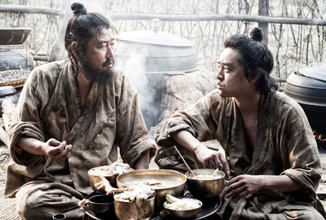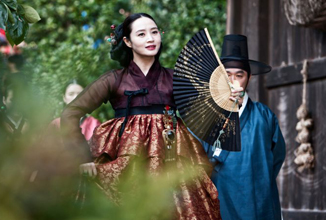"You may be the greatest face reader in Joseon, but I think I'm better at reading people."
Synopsis:
Nae-kyeong (Song Kang-ho) and what remains of his family eke out a less than meagre living making and selling writing brushes; ever since Nae-kyeong's father was disgraced and executed in the Royal Court - bringing dishonour to the family name, in the process. Carrying out face readings on 'the quiet' much to the constant chagrin of the youngest family member who believes that telling someone's destiny from reading their face is nothing but superstition, Nae-kyeong has, almost inadvertently, garnered a reputation as the greatest face reader in Joseon and as such is soon approached by the madam of a courtesan house, Yeon-hong (Kim Hye-soo), offering him a contract to work for her. Seeing the offer as a chance to make a great deal of money from rich Royals, Nae-kyeong decides to accept and before long he is contracted to read the faces of the Royal family, at the King's behest, to ascertain if there is a plot to instigate a coup.
However, though Nae-kyeong initially finds no threat to the Royal lineage he nonetheless soon finds himself and his face reading talents at the centre of a desperate fight to prevent power-hungry Prince Su-yang (Lee Jeong-jae) from attempting to seize control and killing those who stand in the way of him securing the Crown for himself...
Review:
The Face Reader begins with a scene in which an utterly distraught, paranoid and ranting, old man (whose identity is revealed at a much later stage) explains to the guards he has hired to protect him his unshakeable belief that unknown assailants will come to behead him is as a result of "the greatest face reader in Joseon" telling him years earlier that was the manner by which he was destined to die, and without further ado we step back in time to meet that very face reader, Nae-kyeong, as he is approached by the Madam of the Courtesan House for the first time.
In these early stages, continuing through around three quarters of the narrative, there is a noticeable yet beautifully understated humour inherent to proceedings - a deft merging of serious drama and historical farce - allowing the creation of numerous almost laugh-out-loud moments within tense situations (such as Nae-kyeong and his brother snooping around one of the private rooms in the Courtesan House, having to hide in a closet to prevent being discovered and thereafter watching through the closet door slats while the Madam examines several concubines - both with growing interest in what they're seeing and increasing frustration that the Madam's head keeps blocking their view of the 'nuts and bolts', as it were, of proceedings). These genuinely funny moments are not only perfect in their own right but they also both lighten the load of an ever-darkening story and subvert viewer expectations, exactly when needed, to deftly add extra 'punch' to later violent and/or poignant storyline elements.
As such, director Han Jae-rim is able to greatly increase viewer empathy for a group of genuinely funny, likeable characters (or in the case of Prince Su-yang - who replaces humour with sarcasm - deliberately hateful) ensuring that their ongoing struggle is one audiences truly care about; further helped by superb individual character portrayals by each and every single cast member (more on this later).
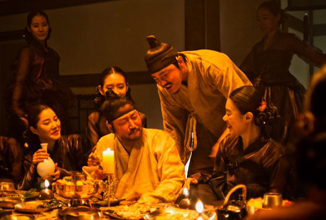 |
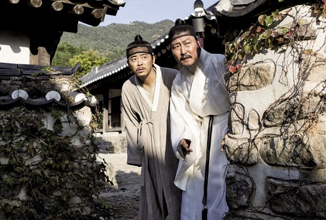 |
In the years since the New Korean Cinema wave, the Joseon era - with its (perceived) outward purity set against an underlying salubriousness and the inherent struggles of the powerless against the powerful and self serving its class structure could almost not fail to create - has provided a setting ripe for multilayered cinematic narratives, be they entirely fictional or based at least in part on factual events, and while it could be said that The Face Reader's themes are somewhat simpler than those of many historical narratives that fact to my mind allows viewer engagement to be achieved with even greater ease, while the film overall still stands easily alongside its predecessors.
Ultimately as nuanced and multilayered as any historical Korean drama you care to mention, perhaps the one aspect by which The Face Reader differs most significantly from the plethora of Joseon era set films is in terms of adult content and nudity - or lack thereof, to be more accurate - and while without question Joseon era tales are the perfect platform for discussion and dissection of sexuality and attitudes to it (both in the historical setting and, by extrapolation, how it relates to the present day), by choosing to sidestep the issue almost entirely, in spite of the courtesan house playing a major part in proceedings, The Face Reader proves once and for all that sex and graphic imagery is not a prerequisite to insightful drama even if the setting actually facilitates its inclusion.
Of course, it virtually goes without saying that The Face Reader moves into melodrama territory in its latter stages, but this serves to far more add genuine poignancy to the story's culmination than feel simply that it is present as an almost inherent element of Korean cinema. Sitting utterly naturally within the overall state of play as well as in relation to individual character traits and motivations, this heart-wrenching section of the film also prevents an all too easy happy-ever-after from taking place (save for a couple of short text statements appearing on screen just before the credits roll), and certainly in this case that really is the way things should be.
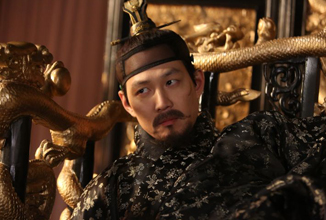 |
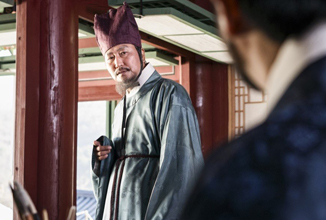 |
Cinematically, The Face Reader is both sumptuous and stunning with the Royal Palace/Royal Court setting allowing for impressive and, frankly, staggeringly beautiful vistas to be depicted on numerous occasions, each used to the fullest.
Interior sets are equally noteworthy and combine with the aforementioned to give a noticeable feeling of expansiveness throughout.
Likewise, lighting, framing and overall direction are nigh on perfect; underlying the quality of the narrative itself to ensure that watching The Face Reader is both memorable and, dare I say, gobsmacking (perhaps not the most delicate of phrases, I grant you, but one which instantly rolls off the tongue in discussing any aspect of The Face Reader).
Cast:
It will likely come as no surprise whatsoever to those with even a passing knowledge of Korean cinema that Song Kang-ho gives a superb performance as Nae-kyeong. Over the years, he has shown his innate talent for playing both well meaning, loveable buffoons and those more worldly-wise, or even calculating, and he draws on all of these various types of characters to bolster his portrayal of 'Joseon's greatest face reader' and add a real personality to the character.
The rest of the cast also provide virtually faultless character portrayals and of these Lee Jeong-jae as Prince Su-yang easily stands out the most. He clearly relished playing the ruthless, power hungry prince and so striking is his portrayal that viewers will likely feel the venom emanating from his every word and deed to a palpable degree.
Note should also be made of Kim Hye-soo's portrayal of Courtesan House Madam, Yeon-hong. Though her role is small in comparison to either Song Kang-ho or Lee Jeong-jae, she nonetheless makes her presence felt in every scene in which she appears; a much needed beautiful female presence within a largely male main cast.
Cast: Song Kang-ho, Lee Jeong-jae, Baek Yoon-sik, Kim Hye-soo
Directed by: Han Jae-rim
Summary:
While The Face Reader could be said to have a somewhat simpler story overall than many of its Joseon era set contemporaries, its narrative is nonetheless as nuanced, multilayered and gripping as any; the sidestepping of any sexual/adult content serving to show that graphic sexual imagery is not a prerequisite, regardless of how much an era's societal structure facilitates its inclusion.
|


